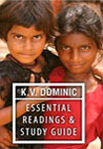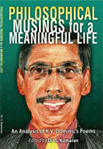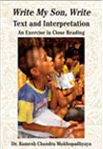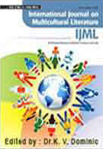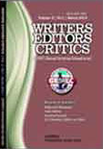Books Review in Detail
Review Of P. V. Laxmi Prasad’s Review of K. V. Dominic’s Winged Reason
Laxmi Prasad’s Review Of Winged Reason
K. V. Dominic. Winged Reason.New Delhi: Authorspress, 2010.
Rs. 95/- pp. 77. Paper-back. ISBN 978-81-7273-530-2
Laxmi Prasad
(Review appeared in Bridge-in-Making, Diamond Jubilee Edition, July 2011. 126-130.)
Winged Reason is Dr. K. V. Dominic’s maiden poetry collection under ISBN. It consists of thirty nine poems and is written in free verse. Authors press, New Delhi, published it in 2010. The collection is dedicated to poet’s beloved father late Varghese Kannapilly. Noted English poet, short story writer and editor Pronab Kumar Majumder has written a wonderful foreword to the collection and it is followed an equally wonderful preface by the poet himself. A collection of pre-publication reviews is appended on the back cover of the book. Dr. Stephen Gill, D.C. Chambial and Sudarshan Kcherry, publisher of Authorspress/Gnosis have presented their views and comments. The poet’s own version of the collection is the added beauty to his poetry. Winged Reason is what I find in the poets’ words: “about losses, including the ultimate loss which is the most unrelenting and grimmest loss of human life. It appears that the poet has experienced those losses himself or has heard closely the cries of the bearers of those losses.†Social themes are, as usual, the pick of this collection. Religious harmony, poverty, corruption, suffering, human cruelty, mafia crime, old age problem of aloofness, misappropriation of money, haves and have-nots, problems of the handicapped, female foeticide, the evils of dowry and disparity, unemployment and neglect of intellect in India. There are two elegies on death. There is dignity of labour, service unto god, maternity and beauty. A thoroughly built humanistic concern dominates the collection. It reflects his impatience and incoherence in the life around him. Going by the poets’ criticism of the collection, I find that he gives much priority to the content of the poem than to its style. He honestly agrees that his poems lack much imagery and other figures of speech. He feels that poetry should be digestible as short stories and novels are appealing to the laymen. He adopts a conversational style in poetry.
The first poem “In Memoriam: George Joson†begins with a question. It is in fact an elegy written on his colleague who died in a car accident. “Why did you leave us so soon, dear Joson?â€Â (17) touches the hearts of readers towards the end. Poet Dominic recollects his fond association with George Joson. “Your absence, everywhere is haunting†(18). The poem is followed by another elegy on the former chief minister of Kerala E. K. Nayanar “Long Live E. K. Nayanar,†a man of the masses. The poet says that E. K. Nayanar was the most lovable CM Kerala had ever borne. He is an epitome of socialism, a soul of compassion and love and a true communist.
Your absence from amidst us
shows your presence among the stars.
You are our polestar
who saves us from Darkness. (“Long Live E. K. Nayanar†20)
A philosophical Dominic goes to present the glimpses of philosophy in a few poems titled “A Sheep’s Wail,†“Haves and Have-nots,†“I am Just a Mango Tree,†“My Teenage Hobby,†“Ammini’s Lament,†“Ammini’s Demise,†“Om,†“How I Became a Vegetarian†and “Solar Eclipse.â€
The sun of knowledge
can hence be eclipsed
by the moon of ignorance. (“Solar Eclipse†67)
“Om†is the poem crafted equally in Hindu philosophy. Being a devout Christian, Dominic feels proud to be born in Kalady, the sacred place where Adi Shankara was born.
Om, the holiest mantra of mantras;
key to all problems of the world;
Om is our breath;
a tonic to mind and body.
. . . . . . . . . . . . . . . . . .
it gives peace and happiness;
Om Shanti, Om Shanti, Om Shanti. (“Om†66)
The poet’s cat, Ammini’s Demise moved him very much. Ammini was poisoned to death.
A thing of beauty
is a joy forever;
and its loss
sorrow forever.
(“Amminis Demise†64)
The poet is socially-conscious and his consciousness finds expression in the poems such as “A Nightmare,†“Anand’s Lot,†“Beauty,†“Tsunami Camps,†“Gayatri’s Solitude,†“Helen and Her world,†“International Women’s Day,†“Lal Salam to Labour,†“Laxmi’s Plea,†“Rahul’s World,†“Vrinda,†“What a Birth,†“Cry of my child,†and “Old Age.†All disparities in the society, problems of the poor, the downtrodden, the marginalized and the suffering of old age have been realistically presented. While the poem “A Nightmare†presents the existing plight of world, “Tsunami Camps†is an evidentially pathetic picture of camps.
I could view the cry of an obese boy
whose mother was beating his to eat more.
A cry of a different note was heard from the next door,
where a bony child was crying for a crumb
(“A Nightmareâ€22)
“Where have gone the crores
collected for our relief?â€
. . . . . . . . . . . . . . . . . . .
“It’s better to kill us than torture like this.â€
“We don’t have sufficient food,
We don’t have pure water.â€
. . . . . . . . . . . . . . . . . . . . .
Unending wails and unending sobs;
not even gods listen to their cries.
(“Tsunami Camps†34)
Then, the poet is shaken by the current state of politics, communalism, corruption and exploitation by political parties and religions which find a poetic expression in the poems “A Blissful Voyage,†“Indian Democracy,†“Solar Eclipse†and “In the Name of God.â€
Elections are what Dominic calls “Several Billion business†and stage of heinous means.â€
National parties play
trump cards with communalism;
. . . . . . . . . . . . . . . . . .
Election campaigns;
fireworks of lies and abuses.
. . . . . . . . . . . . . . . . .
Thus democracy reigns
drinking tears of thousands!
. . . . . . . . . . . . . . . . . . .
Still democracy shall prevail
or tyranny will
sit on the Chair.
(“Indian Democracy†60-61)
“In the Name of God†is a poem of how villainous the individuals act in the name of God. All their sinful actions reflect that they do wrongs (evils & sins) in the guise of pronouncing God’s name.
Millions were killed in crusades
in the name of God.
Democracy is devalued
in the name of God.
. . . . . . . . . . . . . . .
Superstitions survive
in the name of God.
Communalism poisons
in the name of God.
. . . . . . . . . . . . . . . .
Terrorists butcher thousands
In the name of God.
Teens became terrorists
in the name of God.
. . . . . . . . . . . . . . . . .
Secularism is nullified
in the name of God.
. . . . . . . . . . . . . .
God is dethroned
in the name of God.
And human gods are crowned
in the name of God.
(“In the Name of God†69-70)
Nature continues to haunt every poet. Dominic’s passion for nature is strongly built in the poems such as “Nature’s Bounties,†“Harvest Feast,†“Cuckoo singing,†“Onam†and “Sleepless Nights.â€
The Sun kisses
The eye opens
Lotus Blooms
(“Nature’s Bounties†49)
Parched fields
Rain in summer
Honey to the lipsâ€
(“Nature’s Bounties†50)
The poet proudly says that he is born in the land that is known as God’s Own Land and Destination, Kerala has a “pleasant, equable climate and high density of population. It is dear to tourists all over the world. The poet recalls with pride that Keralites celebrate ONAM festival wherever they are. It is a ten-day celebration starting with Atham. It is vividly described in the simplest of expression.
People in new dress;
full of gaiety and spirits;
. . . . . . . . . . . . . . . . .
relishing ceremonial food;
delight in Onam songs
Onam plays and Onam dances.
(“Onam†53)
“City Versus Village†is a poem of contrasting life styles.
How hard it is–
the city dwellers–
Busy and selfish,
devoid of humanity
Each one lost
in his own island.
. . . . . . . . . . . . . .
How innocent and malice-free
is village life!
where all live
in harmony and love.
(“City Versus Village†71-72)
Dominic expresses anguish against man’s unequal and irrational treatment towards fellowmen and which plants and animals never do.
Plant and animals never divide
the earth among themselves;
What right has the mortal man
to divide and own this immortal planet?
(“Haves and Have-nots†36)
To conclude the review, I reckon that poet K. V. Dominic is compassionate, sympathetic, philosophical, realistic, reflective, nature-loving, protesting, condemning and finally humanistic–in all the 39 pyramid-like poems of this collection. He is not only the voice of individuals but also the voice of organized society and institutions. Though the poems are written in the simplest of expression, they are inherently structured around multiple themes of society.
–Prof. Laxmi Prasad (English Critic, Poet, Reviewer), Andhra Pradesh, India.

